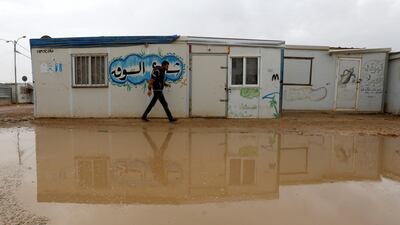Jordan has adopted new measures to make it easier for Syrian refugees to obtain work permits in the construction sector, a move that is expected to improve the living conditions of those who work in the industry and protect them from abuse at the hands of employers.
On Wednesday, the country's trade unions began issuing work permits directly to Syrian refugees working in construction — one of several sectors open to non-Jordanians. Previously, such work permits could only be obtained by employers on workers' behalf, making refugees vulnerable to exploitation.
The cost of work permits has meanwhile been reduced from 200 Jordanian dinars (Dh1,036) to just 10 (Dh52) dinars.
The measures came after the International Labour Organisation (ILO) co-ordinated an agreement between the Jordanian government and trade unions in June which allows the unions to issue 10,000 refugees applying for the first time with 12-month, renewable work permits every year.
Under the terms of the agreement, refugees are required to purchase 50-dinar insurance policies along with their work permits. These policies replace the social security subscriptions required under the old permit system, which cost workers 21 per cent of their salaries under law.
Jordan, which hosts 1.3 million Syrians, including more than 660,000 registered with the UN refugee agency, is the first Arab country in the region to issue such work permits.
------------------------------------------------------------------
Read more:
Life as a Syrian refugee facing danger on Jordan's border
More Syrian child brides in Jordan amid poverty and uncertainty
Refugees in Jordan brace for big freeze
------------------------------------------------------------------
The vast majority of Syrians who fled to Jordan since war broke out in their country in 2011 live outside of the official refugee camps, many in dire conditions and with little to no support from cash-strapped international aid organisations. Four out of five live below the poverty line.
Jordanian labour laws stipulate that a working week must not exceed 40 hours, unless workers are compensated for overtime. But a June ILO assessment of work permits and the employment of Syrian refugees in Jordan found that most working in construction were employed on a piece rate basis, while the majority worked over 40 hours a week. Only ten per cent of those with permits had been compensated with overtime pay.
“The new permits will regulate the working conditions for Syrian labourers, provide them with legal cover and limit exploitation and blackmail by their employers,” said Mazen Al Maaytah, president of the General Federation of Jordanian Trade Unions.
“So we needed to ensure that their rights are protected and that the market will be regulated.”
For years, Jordan — which is battling its highest unemployment levels for over a decade — has made it difficult for Syrian refugees to obtain work permits. As a result, many have been working illegally.
Since February last year, however, Jordan has been making it easier for refugees working in certain industries — including construction, agriculture, service and manufacturing — to receive work permits. The move was part of commitments agreed to by Amman at a Syria donor conference in London in exchange for increased Jordanian access to the European Union market and increased foreign investment in Jordan. But until Wednesday, work permits still had to be obtained by employers on workers' behalf.
The new measures were welcomed by Syrian refugees.
“The permits provide protection for my son,” said Um Mahmoud, 38, a Syrian refugee who lives in the northwestern city of Ramtha.
“Ever since Mahmoud (18) finished school, he has been looking for a job. I hope he will be able to help with the expenses to pay the water and electricity bills. We do not have any support.”

